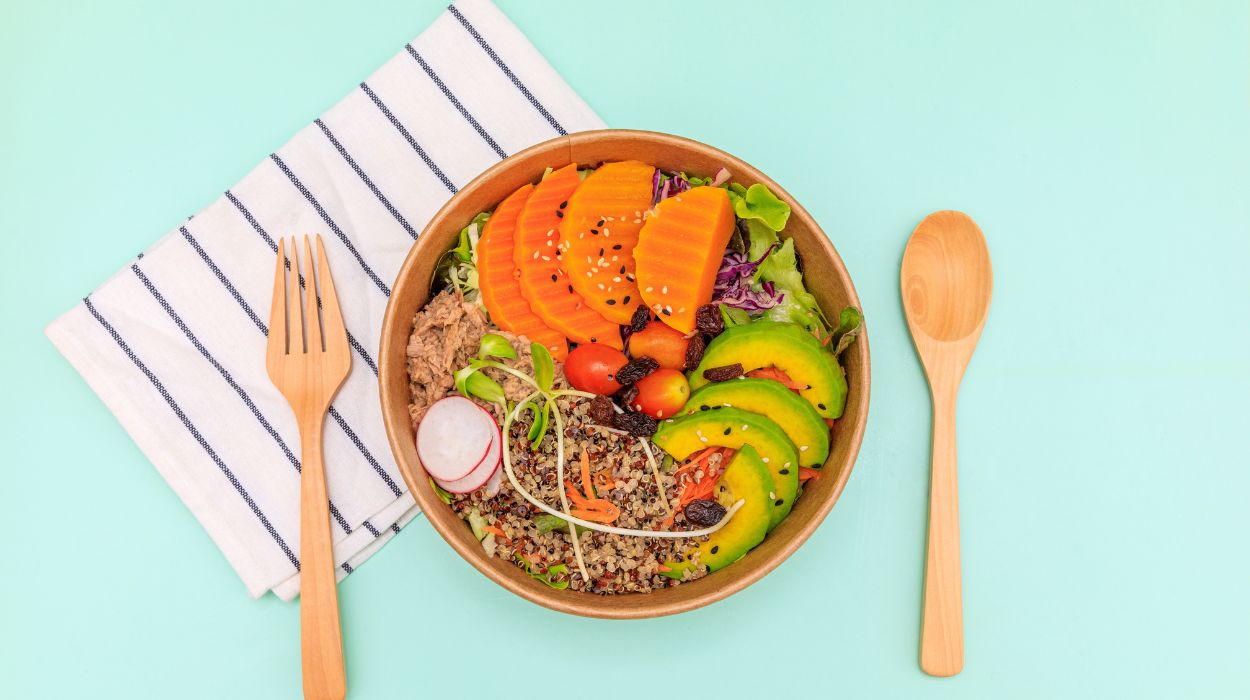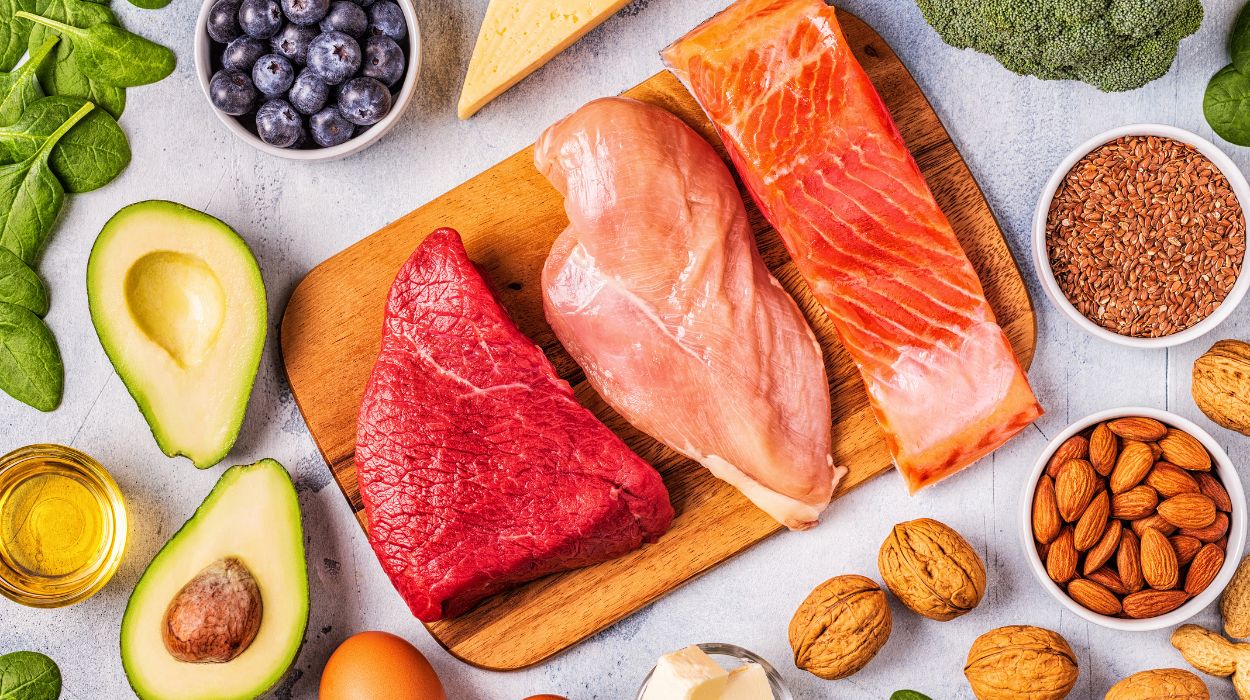 Expert's opinion
Expert's opinion
Expert's opinion
The article is a subjective view on this topic written by writers specializing in medical writing.
It may reflect on a personal journey surrounding struggles with an illness or medical condition, involve product comparisons, diet considerations, or other health-related opinions.
Although the view is entirely that of the writer, it is based on academic experiences and scientific research they have conducted; it is fact-checked by a team of degreed medical experts, and validated by sources attached to the article.
The numbers in parenthesis (1,2,3) will take you to clickable links to related scientific papers.
Keto Vs Paleo 2024: The Differences Between 2 Low-carb Diets

Today, the paleo vs. keto diets are among the most widely discussed eating plans. Certainly, they both have potential that motivates researchers to dig deeper. The diets are often combined with supplements for weight loss for optimal results. Paleo and keto diet plans share many benefits but have some fundamental differences. To determine if a keto or paleo diet is best, we must look at the facts rather than just the marketing claims. So, here’s what we learned after researching dozens of reliable sources:
The Difference Between Keto And Paleo
The main difference between paleo and keto is the basis for their creation.
Although the keto diet is sometimes used as a catch-all for paleo, South Beach, Atkins, and other similar low-carbohydrate diets, they also differ in
- Amounts of cholesterol.
- Dairy product regulations.
- Vegetable variety.
The paleo and keto diets are nutrient-dense, promote weight loss, and protect against cardiovascular disease. However, the two diets omit essential foods such as grains, and some starchy vegetables (like potatoes), increasing the risk of micronutrient deficiency.
What Is The Difference Between Keto And Paleo Diets?

The Basis Of Their Formulation
The keto diet chooses foods based on carbohydrate content, while the paleo diet bases its selection on the diet of early humans.
Emphasis On and Against Fat Intake
Consumption of consumable fat is the most noticeable difference in the comparison of keto vs. paleo diets. While ketogenic diets rely heavily on saturated and unsaturated fats, paleo diets do not.
Dairy Products
Paleo diets are anti-dairy, whereas ketogenic diets allow certain types. Flavored yogurts are discouraged on the ketogenic diets, but high-fat plain yogurt and cheeses like cheddar and provolone are encouraged.
Variety Of Vegetables
The Paleo diet encourages a wider variety of fruits and vegetables, including starchy vegetables, whereas ketogenic diets are more restrictive.
What Is The Paleo Diet?
The Paleolithic era, which occurred 2.5 million years ago,[1] inspired the paleo diet. The diet is also known as the hunter-gatherer diet, caveman diet, or stone-age diet. It consists of foods thought to have been consumed by early humans who lived during the period. Lean meat, fish, seeds, nuts, eggs, fruits, and vegetables are the staples of the Paleolithic diet. It does not include dairy products, cereals, or processed foods.
The paleo diet claims human genes[2] are not naturally adjusted to today’s foods. As a result, the mismatch between modern food and human genes is the root cause of obesity, diabetes, and heart disease.
Benefits Of Paleo Diets
Supports Weight Loss
Paleolithic diets are low in carbohydrates and sugars, which are known to cause weight gain. It promotes organic foods while condemning highly processed foods, artificial ingredients, and colorings. Moreover, it promotes weight loss by recommending healthy food choices like fruits and most vegetables. Studies have shown it lowers triglycerides,[3] low-density lipoprotein cholesterol, and total cholesterol.
Rich In Essential Nutrients
The paleo diet for weight loss can be high in nutrients like potassium, fiber, and antioxidants, all of which benefit your overall health. But this is only true if you replace your grains and dairy with fruits and vegetables.
Prevents Cardiovascular Disease
This diet is believed to be beneficial for type 2 diabetes and cardiovascular health. The paleo diet can lower cholesterol and triglyceride levels and may have weight-loss effects. It lowers the risk of cardiovascular diseases such as high blood pressure, heart attack, and stroke.
Prevents Diabetes
The diet discourages the consumption of sugars and carbohydrates. As a result, people following the Paleo diet long term can lower the risk of diabetes.
Reduces Blood Pressure
Studies have shown that the paleo diet may lower fasting plasma glucose,[3] insulin, and sugar stuck in red blood cells.
Shortcomings Of Paleo Diets
It Can Be Expensive To Implement
The paleo diet promotes fruits, vegetables, and natural foods with a short shelf life. But natural foods like seafood and pasture-raised meat may be more expensive than processed foods.
Discourages Some Essential Foods
The paleo diet excludes entire food groups, such as whole grains and dairy products, which can cause significant deficiencies over time. It may result in a lack of essential nutrients[3] such as calcium, choline, and vitamin D.[4] While there are alternative calcium sources in vegetables, these sources may be bound up by phytic acid, an antinutrient found in some high-fiber foods. Thus, you may need more supplemental calcium than consumed to meet your daily recommended intake[5] (1,000-1,200 mg/day for healthy adults).
Red Meat Risks
Some researchers have expressed concern about excessive red meat consumption in the paleo diet. Excessive intake of red meat has been linked to cardiovascular disease[6] and diabetes in studies.
What Is The Keto Diet?
The ketogenic diet is a very low-carb diet that’s moderate in protein and requires significantly reduced carb intake. The keto diet can be a catch-all term for paleo, South Beach, and Atkins diets. However, unlike the paleo diet, keto diets are based on the idea that restricting carbohydrates forces the body to burn fats.
It thereby supports weight loss through ketosis. Ketosis is a metabolic state in which the body actively burns fat reserves instead of glucose for consistent energy release. The ketogenic diet is composed of 55% to 90% fat,[7] 30% to 35% protein (or 1 mg/kg body weight), and 5% to 10% carbohydrates. Note that few keto diets contain more than 75% fat calories except those used in treating epilepsy in children.
Benefits Of Keto Diets
Provides Sustainable Energy
The keto diet restricts carbohydrate consumption, forcing the body to generate energy from fat reserves. It also may not give you the usual sugar crash after eating a carb-filled meal.
Supports Weight Loss
Carbohydrates are easier to digest and more easily obtained from food. As a result, the body primarily breaks down carbohydrates to produce energy. On the other hand, ketosis burns stored fats, which aids in weight loss.[7]
Prevents Cardiovascular Diseases
With fat loss, the ketogenic diet can lower the risk of cardiovascular diseases,[8] such as stroke and high blood pressure. Of course, this depends on the quality of the diet since you can technically eat great amounts of red meat and dairy — which will negatively affect your overall health.
Also, because of their low carbohydrate content, ketogenic diets are becoming increasingly popular for managing type 2 diabetes.[9]
Keto Diets Shortcomings
High In Saturated Fats
Saturated fats can be abundant in the ketogenic diet, increasing the risk of heart disease. Some studies show that the keto diet can increase cholesterol,[10] worsening cardiovascular risk, but others say the high cholesterol results from weight loss. This is why the food quality and the amount of vegetables eaten are so important when considering the keto diet.
The high-fat content of the keto diet can also overwork the liver,[11] exacerbating pre-existing conditions.
May Cause Deficiencies
The ketogenic diet restricts many fruits, starchy vegetables, and grains. Eliminating or restricting such foods risks the depletion of micronutrients like magnesium, selenium, phosphorus, and vitamins B and C. Additionally, constipation is exacerbated by the absence of fibrous foods such as grains and legumes.
Overworks The Kidneys
The ketogenic diet can be moderately high in protein, which can overwork your kidneys and lead to kidney stones,[12] among other problems.
Deprives Mental Energy
Sugars from healthy carbohydrates allow the brain to function at its best. A lack of carbohydrates can lead to mood swings,[13] confusion, and irritability.
Similarities Between The Paleo Diet And Keto
While the two are entirely different, there are some similarities between the paleo vs. keto diets:
No Grains And Legumes
Both the paleo and keto diets discourage grains. Given that they were not a part of the diet of early man, grains and legumes have a counter-effect on the paleo diet. They also negatively impact the keto diet due to their carbohydrate content.
No Unhealthy Foods
The paleo and ketogenic diets discourage the consumption of refined carbohydrates, sugars, and processed foods. Such foods are regarded as harmful in various health contexts. Both diets advocate swapping them for whole foods like meat, fish, fruits, vegetables, nuts, and seeds.
High Likelihood Of Weight Loss
Obesity, high blood pressure, and heart disease are all addressed by the keto and paleo diets. The diets are well-known for their ability to help people lose weight.
Both Encourage Complementary Lifestyle Habits
The paleo and keto diets promote pairing healthy diets with healthy routines like exercise and stress management.
Paleo Vs Keto: How To Choose The Right Diet For You

When deciding which diet to follow, many factors must be considered. This includes the flexibility of your daily routine, cooking experience, and cultural factors.
Flexibility
A keto meal plan may be best for you if your work schedule is hectic because it allows easy-to-prepare foods.
Cooking Experience
Learning to cook for either diet is helpful because they emphasize fresh and homemade meals while discouraging processed foods.
Cost
Both diets require fresh, natural foods, so the cost of implementing them is roughly equal. However, paleo diets may be expensive due to the prohibition of legumes, grains, and dairy. Plus, they encourage pasture-raised animal products, which can be quite costly.
Likability
You will be following either diet for months or years. Therefore, you should consider how you like their variety of food.
Cultural And Social Factors
If cultural or religious beliefs restrict you, you must consider a diet that provides equally satisfying alternatives.
Nutritional Value
Consider which diet provides a broader variety of foods to meet your daily nutrient requirements.
Finally, remember that healthy lifestyle changes take time. You can also combine healthy meal plans with fat burner supplements for faster results. With patience, self-compassion, and small, achievable goals, you can develop lifelong healthier habits and avoid yo-yo dieting stress.
The Bottom Line
Choosing and implementing a new diet takes time and effort — but there’s no magic pill to healthy living.
It takes lots of patience and self-care because actual results take time to develop — and they last. But a simple diet plan can help you get started.
The paleo and keto diets share many foods, but the slight differences can significantly influence your choice. While paleo diets are based on foods eaten before farming, ketogenic diets are anti-carbohydrates. You can look up tasty and healthier recipes that substitute for your favorite foods, particularly high-processed treats.
Either way, any diet can be successful if you eat a balanced diet with lots of fresh fruits and vegetables and avoid unhealthy foods like sugar and refined carbohydrates.
+ 13 sources
Health Canal avoids using tertiary references. We have strict sourcing guidelines and rely on peer-reviewed studies, academic researches from medical associations and institutions. To ensure the accuracy of articles in Health Canal, you can read more about the editorial process here
- Challa, H.J., Manav Bandlamudi and Uppaluri, K.R. (2023). Paleolithic Diet. [online] Nih.gov. Available at: https://www.ncbi.nlm.nih.gov/books/NBK482457/.
- Alt, K.W., Al‐Ahmad, A. and Johan Peter Woelber (2022). Nutrition and Health in Human Evolution–Past to Present. Nutrients, [online] 14(17), pp.3594–3594. doi:https://doi.org/10.3390/nu14173594.
- Frączek, B., Aleksandra Pięta, Burda, A., Mazur-Kurach, P. and Florentyna Tyrała (2021). Paleolithic Diet—Effect on the Health Status and Performance of Athletes? Nutrients, [online] 13(3), pp.1019–1019. doi:https://doi.org/10.3390/nu13031019.
- Titcomb, T.J., Babita Bisht, Moore, D.D., Chhonker, Y.S., Murry, D.J., Snetselaar, L. and Wahls, T.L. (2020). Eating Pattern and Nutritional Risks among People with Multiple Sclerosis Following a Modified Paleolithic Diet. Nutrients, [online] 12(6), pp.1844–1844. doi:https://doi.org/10.3390/nu12061844.
- Nih.gov. (2014). Office of Dietary Supplements – Calcium. [online] Available at: https://ods.od.nih.gov/factsheets/calcium-HealthProfessional/.
- Rica, N., Hanne Christine Bertram, Heddie Mejborn, Lars Ove Dragsted, Kristensen, L., Jorge Ruiz Carrascal, Bügel, S. and Astrup, A. (2021). Meat and Human Health—Current Knowledge and Research Gaps. Foods, [online] 10(7), pp.1556–1556. doi:https://doi.org/10.3390/foods10071556.
- Masood, W., Pavan Annamaraju, Khan, Z. and Uppaluri, K.R. (2023). Ketogenic Diet. [online] Nih.gov. Available at: https://www.ncbi.nlm.nih.gov/books/NBK499830/
- Luo, W., Zhang, J., Xu, D., Zhou, R., Zhou, Q., Qin, Y. and Qiujv Lv (2022). Low carbohydrate ketogenic diets reduce cardiovascular risk factor levels in obese or overweight patients with T2DM: A meta-analysis of randomized controlled trials. Frontiers in Nutrition, [online] 9. doi:https://doi.org/10.3389/fnut.2022.1092031.
- Alarim, R.A., Alasmre, F.A., Alotaibi, H.A., Mohammed Ali Alshehri and Hussain, S.A. (2020). Effects of the Ketogenic Diet on Glycemic Control in Diabetic Patients: Meta-Analysis of Clinical Trials. Cureus. [online] doi:https://doi.org/10.7759/cureus.10796.
- Burén, J., Ericsson, M., Teixeira, R. and Sjödin, A. (2021). A Ketogenic Low-Carbohydrate High-Fat Diet Increases LDL Cholesterol in Healthy, Young, Normal-Weight Women: A Randomized Controlled Feeding Trial. Nutrients, [online] 13(3), pp.814–814. doi:https://doi.org/10.3390/nu13030814.
- Anekwe, C.V., Chandrasekaran, P. and Fatima Cody Stanford (2020). Ketogenic Diet-induced Elevated Cholesterol, Elevated Liver Enzymes and Potential Non-alcoholic Fatty Liver Disease. Cureus. [online] doi:https://doi.org/10.7759/cureus.6605.
- Girma Minalu Ayele, Rediet Tefera Atalay, Mamo, R.T., Hussien, S., Beimnet Nigussie, Fissha, A. and Michael, M.B. (2023). Is Losing Weight Worth Losing Your Kidney: Keto Diet Resulting in Renal Failure. Cureus. [online] doi:https://doi.org/10.7759/cureus.36546.
- Marwan El Ghoch, Calugi, S. and Riccardo Dalle Grave (2016). The Effects of Low-Carbohydrate Diets on Psychosocial Outcomes in Obesity/Overweight: A Systematic Review of Randomized, Controlled Studies. Nutrients, [online] 8(7), pp.402–402. doi:https://doi.org/10.3390/nu8070402.



